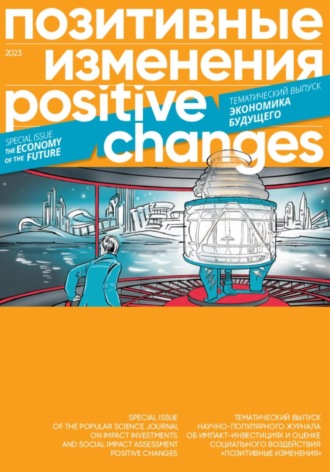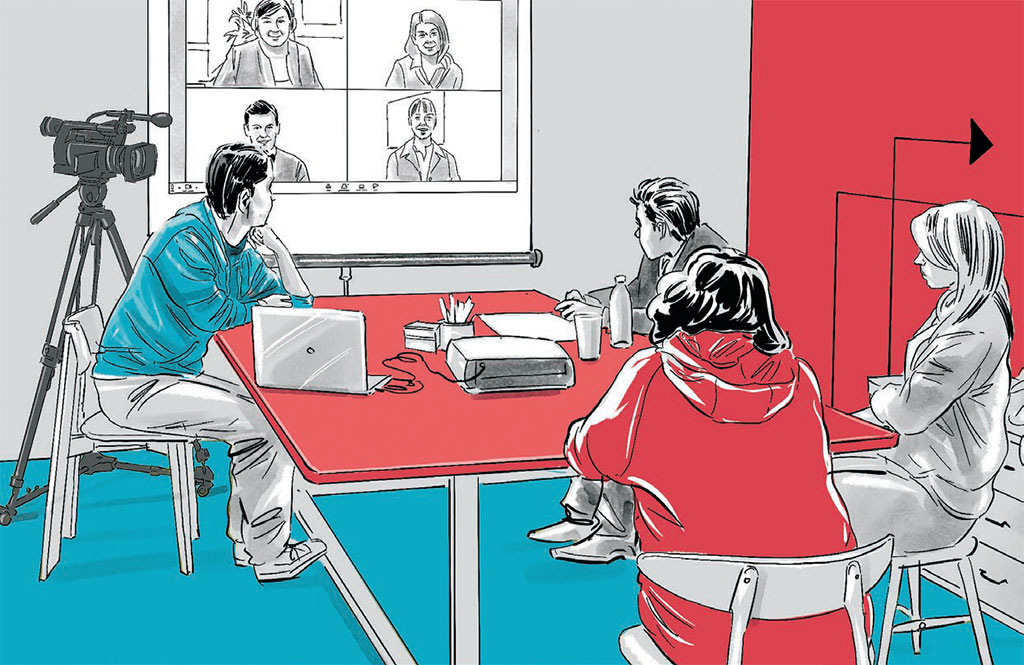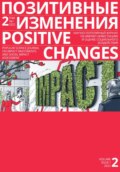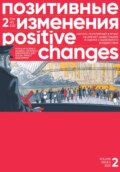
Редакция журнала «Позитивные изменения»
Позитивные изменения. Тематический выпуск «Экономика будущего» (2023). Positive changes. Special issue «The economy of the future» (2023)
Хотя деньги на перспективные исследования, на создание прототипов и сейчас выделяются – то, что называется в мире Curiosity Science. Это и есть приближение будущего.
Артем Шадрин: Необходимо, как мне кажется, подготовить следующий шаг в масштабировании практики использования результатов исследований будущего – то, что в мире обычно называют Future Research и Futures Studies.
За последние несколько лет в ряде стран произошла институционализация практики исследований будущего, запускаются новые университетские программы, развиваются профессиональные сообщества, работают такие международные организации, как Association of Professional Futurists и World Future Society.
Методология стратегического форсайта стала уже мейнстримом, а не чем-то маргинальным, она рассматривается как важный и даже необходимый элемент в стратегическом планировании развития компаний. И это не подготовка неких предсказаний – «через 50 лет будет так-то», а, например, построение набора сценариев, исходя из которых становится возможным более обоснованно выстраивать разработку стратегий.
Это принципиально отличается от устаревших практик линейной экстраполяции экономических трендов, которые в любом случае будут меняться, хотя бы вследствие сложной взаимосвязи многих перспективных технологических и социальных изменений. А это означает, например, и необходимость использования при прогнозировании междисциплинарного подхода, которым зачастую пренебрегают.
Типичная ошибка при прогнозировании воздействия на экономику и общество какой-нибудь новой технологии или проекта заключается в том, что неявно предполагается, что в будущем все останется как было, а изменения будут связаны только с предметом рассмотрения, что очевидно не так. Поэтому формирование различных образов будущего, комплексных сценариев развития экономики и общества принципиально важно.
Если говорить еще о некоторых шагах по ускорению приближения желаемого будущего, то первое, что хотелось бы отметить – это новый этап в развитии непрерывного образования, который позволил бы использовать максимум из появляющихся в мире результатов исследований и новых практик.
Мне в этом плане нравится идея основателей московской Школы системного менеджмента о целесообразности прохождения «второго бакалавриата» в формате ДПО, который позволял бы, скажем раз в 10–15 лет, системно актуализировать набор базовых, а не только отдельных узкопрофессиональных компетенций, с учетом новых появившихся подходов в разных отраслях знаний.
Думаю, уже сейчас это решительно необходимо, например, тем, кто готовится стать директором по развитию в своей компании, а также тем, кто отвечает за управление изменениями, кого за рубежом называют Chief Reinvention Officer.
Плюс еще один важный алгоритм, помогающий движению вперед, наряду с проведением собственных оригинальных исследований – это проведение бенчмаркинга, системное выявление лучших практик и проведение с их учетом пилотных проектов для возможного тиражирования действующими организациями. То есть обеспечение ускоренной адаптации появляющихся в России и мире новых конкурентных преимуществ и успешных технологических решений.
Владимир Вайнер: На этой позитивной ноте менеджмента изменений мы заканчиваем нашу встречу. Если такой формат кажется значимым, мы можем повторять его онлайн, офлайн и в любой точке мира. Это кажется правильной задачей по приближению горизонта будущего.

Текст подготовила журналист Татьяна Печегина
Economy of the Future Through the Eyes of Futurologists. Positive Changes Journal Expert Discussion
Tatiana Pechegina
DOI 10.55140/2782–5817–2023–3-S1–19–31

Leading economists and futurologists met at the session organized by the Positive Changes Journal and devoted to the main topic of the special issue – the economy of the future. Will there be an increase in prosperity and where will it lead? What are the trends in economic development? What should be envisaged while building an economic development scenario? Will the economy of the future become human-centered? Are the fears of artificial intelligence justified? How will space be explored? What do we need to do to bring the kind of future we like closer? The panelists discuss this and much more. The conversation was facilitated by Vladimir Vainer, director of the Positive Changes Factory. The editorial staff publishes a transcript of the conversation.

Vasily Burov
Futurologist, advisor at the Moscow Institute of Electronics and Mathematics, HSE University, co-founder of the Information Culture NGO

Artem Shadrin
Director of the Institute of Social and Economic Design, HSE University

Kirill Ignatyev
Futurologist, Chairman of the Board of Directors of the Russian Investments Group, head of the Technical Progress and Future Economy project

Vladimir Vainer
Positive Changes Factory, Director
Vladimir Vainer: What phenomena today can be seen as signs of the economy of the future? Which of the signs will definitely lead to it, which of the trends are we to strive for, and how do we bring them closer?
It is interesting to talk about a future that is not obvious, but that can be made obvious. The way I see it, predictions can be made over a timespan of two generations. This is a kind of practical, motivational vector, so that, as they say, our children’s children are proud to say: "Our fathers invented all this back in the day.”
Kirill Ignatyev: I agree, and I would add that in the context of the economy of the present and the future, it is a good idea to measure today and tomorrow by technological paradigms. The current technological paradigm started at the end of the last century with the emergence of mobile communication and the Internet; now there is a period of transition, after which the last generation of this technological paradigm will inevitably leave and a new one will arrive. When power passes to a generation twice as young, the most important next step will follow. It defines a lot – we do not measure economic history in centuries anymore.
Artem Shadrin: Two things seem most significant to me: first, economic growth, technological development, growth in prosperity will continue with any forecast short of a catastrophe. Therefore, one of the trends will be a reduction in the amount of time people devote to paid work in the traditional model, and an increase in the share of leisure time, or activities motivated by non-economic considerations – charity, volunteerism, etc.
As the overall wealth increases, it will become possible to choose a job that may bring more satisfaction and less money. In other words, a higher average salary will be losing its significance in favor of other factors, such as a comfortable team – colleagues, management, atmosphere, and understanding of the importance of the activity carried out, its creative, non-routine nature.
The second important thing is that you will have to change faster, to be more flexible if you want to be the winner, including an economic victory. Thus, the number of enterprises for which continuous changes become the norm and which are transformed from force majeure to the practice of regular management will increase all the time. Further spread of mechanisms such as agile, corporate entrepreneurship, and corporate universities will continue.
On the other hand, in the conditions of rapid changes, small and medium-sized businesses, startups, which are more motivated and faster decision-makers than many large enterprises, will gain additional competitive advantages. This additionally raises the priority of dedicated startup financing mechanisms, such as venture capital financing and business angel investment, helping those players who are early in the enterprise lifecycle to reach a scale that allows them to operate successfully.
To summarize, an answer will be provided to the challenge associated with the need to consider the intangible, motivational component in the work. And the transformation of management tools of large companies will be guaranteed, which will lead to an acceleration of corporate innovation.
Vasily Burov: I think the story about social relationships, about involving people in the public, is very important. Right now, our general, and the one a little younger, are basically the last people to have an idea of what it is like not to be in touch all the time. It is a story about social relationships, about mutual help, etc. When the need for intermediaries linking people at different times and places disappears, it greatly changes social behavior and horizontal social relationships. New relationships have not yet been born, but there is a kind of substitute for them. I am talking specifically about the human-to-human communication in a network which has never been as dense as it is now.
Artem Shadrin: And this is facilitated by technologies, take videoconferencing for example.
Kirill Ignatyev: Continuing with the first presentation, I would like to offer a few theses from today’s "tomorrow," so to speak. First of all, two reservations must be made.
Until the current technological paradigm changes, the economy, which just recently was developing according to the global model, will become mixed (a world of blocs), as it adjusts to the adoption of sanctions, the creation of tactical alliances and conflicts. On this basis, we can foresee parallel technological services emerging in each bloc, and the growth of new forms of corruption associated not with the leading role of the state, but with the introduction and circumvention of inter-bloc restrictions. One might say that corruption is entering the global level.
And secondly, when we consider the economy of the future, we always put aside 10 % for the scenarios of the "black swan" economy, that is, in case, roughly speaking, of an apocalypse, a global catastrophe (such as a world war or a supervolcano eruption). Even the unlikely options must be considered.
As for the baseline scenario, i.e. a progressive economy, the first thing that will happen is a dramatic reduction in wage employment in companies over the horizon of two generations. Companies will be buying competencies and skills, rather than working time. And secondly, based on the current situation with aggravating global conflicts, it is obvious that the economy will get tired of stress, and we will see a major trend towards anthroponomics, that is, a human-centered economy, which will be oriented towards humane values, healthy lifestyle, values of human life, medicine, environment, etc. I foresee the role of this exact sector as the point of most important and rapid growth.
Another important point is the predictive nature of the economy, which today is defined by technologies. This trend will actually eliminate the crises of overproduction, since most of the manufacturing will be order-based. The monetization mechanisms will also change accordingly.
The production of Internet-enabled glasses that allow us to broadcast a picture of our vision will change social media. Today we simply post photos and videos on social networks; with the proliferation of such a gadget, we will just stream and buy instantly. Literally, monetization will be based on the principle: "I saw, I blinked, I gave a voice command, I bought.” And this, by the way, means a huge layer of advertising, trade, etc. will disappear. Or, for example, moving away from cash means that traditional forms of corruption, the black market and uncontrolled cash flows will be a thing of the past. But at the same time a new market of additional entities, called digital twins, will emerge. A virtual marketplace that is no longer particularly tied to an entity such as a person.
In the long run, I would note the gradual replacement of big energy industry with other sources – thermonuclear, getting energy from the marshes, from the ocean, from space. This means a radical change in existing economic models associated with traditional energy sources.
Vasily Burov: We are not discussing whether something will appear or not, but rather what consequences it will have. It is already possible to discuss a large number of scenarios generated by the inevitable. The only scenario that takes us in a completely different direction is the scenario of a global nuclear war, which we leave out of the equation.
The topic of artificial intelligence seems important to me. No matter the hype around it, it has matured, so to say, and fundamental changes are coming, and they occur precisely because of the "universal connection” mentioned earlier. It gives continuous factual transparency to our lives. It is quite obvious that today this is clearly an underestimated technology, because, in fact, we have learned how to replace living things, although so far we do it for the sake of an experiment and in a very limited way. But within two generations it will become the norm, we, humanity, will learn to benefit from it.
Artificial Intelligence is very good at performing simple intellectual activities. Until recently, it was thought that AI was invariably worse than the humans in conventional creative industries; now at least in the field of writing or creating illustrations, this is no longer the case. You have to understand that the bulk of the market (in terms of money and employment) is not at all Chagall, Prokofiev, and Chekhov, but the producers of a mass of disposable works which are no longer needed. So artificial intelligence will not be able to replace humans only as long as things are institutionalized the way we are used to. The same will happen everywhere, even in areas such as public administration. Although, for example, replacing high-level officials is quite difficult, otherwise policy-making will turn into degenerated utopian cases with purely rational rules (which, as history shows, means trouble). Most likely, the structure and role of the state will be radically transformed, but it will still be a structure where people are needed.
Attention here should be paid to the following points. What artificial intelligence primarily takes away from us humans is "grassroots," routine intellectual activity. And we gladly give it away, because it is humiliating to read endless reports on "who is changing the light bulb".
But we have become accustomed to the fact that it is routine work that builds up competence, which means that it is necessary to revise the education, the life path of the person, to really move from buying working time to buying competence. Today we have a generation that has grown up with the belief that it is their working time that must be sold, that it is neither possible nor right to sell competencies as such, that they should not be responsible for themselves but rather some system they are integrated in. This situation is observed not only in Russia. But the process is already underway.
Vladimir Vainer: There are more and more questions about human learning and the increasing role of artificial intelligence, and in fact about all of us already having our digital twins. Artificial Intelligence can probably play the role of a tutor that accompanies us in this growth of competencies. And then the vector will be directed towards where a person should develop in a world where many tasks have already been delegated to artificial intelligence. More and more free time, less and less regular work, more anthropocentricity – but where do we get with all this?
And the second question is: if the dependence on raw materials and the general approach to raw materials and the energy is changing, alongside with the approach to issuers, the amount of money, its adaptation to the growing number of services, the approach to the traditional economy, where issues of profit and its disposal, income and goals of entrepreneurial activity are relevant, must also change. Then it makes no sense to state in the civil code that the purpose of entrepreneurial activity is generating profit. It turns out that radical changes are coming in the semantic part of economic management.
Where can a person develop in all this situation, if we are moving away from our main thing – Adam Smith’s notion about supremacy of profit?
Artem Shadrin: In the foreseeable horizon of two generations, the departure from the Adam Smith’s model will not happen yet. Reducing working hours by itself, through increased productivity and multifactor productivity, will not change the current economic model.
The transition from a rural society to an industrial society happened when the employment in agriculture in developed countries dropped from 90 % to just 5 %. In the new economy, high-level analytics, creativity, etc. will certainly be left to humans.
There are, of course, risks, such as "falling into the matrix,” roughly speaking, when everyone has a minimum consumer income, everyone is on their own and everyone plays computer games from morning till night.
The alternative scenario is a "bright communist future" described in Noon: 22nd Century, where everyone is engaged in creative, interesting, constructive work.
But then it is about completely different requirements for supporting human development. Anthropocentricity is not only about the customization of services, but also the emphasis on the education and upbringing system, in the high sense of those words. It is known that, for example, in Finland the teacher is one of the highest paid professions, schools implement an individual approach to each child regardless of performance, etc. We need to start with this, and continue to move quickly in terms of prioritizing the development of education and upbringing.
Third, the development of artificial intelligence, combined with the expansion of the ability to customize social networks and in general with the incoming information feed being shaped to the characteristics of the individual, creates risks of serious abuse, behavior manipulation, the "perfect anti-utopia," which is quite compatible with the "falling into the matrix" scenario.
The question is to ensure that the right attractor is selected and retained. It is no coincidence that Europe has adopted a fairly strict law on personal data storage, which helps to prevent its use for artificial manipulation. In general, the priority of open access to information (in balance with security) is a key one.
And the last point, about the fatigue from the sanctions and the transition to a new, more humane society on a global scale. There are risks associated with the fact that as economic potential grows, some social groups may decide: "We’ve reached some level of income, welfare, let’s get on with non-economic priorities and start, say, a forceful confrontation to solve our narrow-group objectives." I have a concern that a certain level of aggression is inherent in any person. Ensuring that it is not channeled into socially dangerous behavior is not an obvious task.
Vladimir Vainer: Yes, if we proceed from the thesis that aggression is an intrinsic part of the human being and the society, then it must be constantly considered. And whatever the economic future holds, this risk will arise. When we have no economy, we fight for resources; when the resources are abundant, we fight over other things… Although it would seem that if we want to fully control aggression, we just need to choose the right attractors, to properly customize human brain activity, thanks to the smart glasses…
Artem Shadrin: This is as bad an option as controlling aggression through a "concentration camp." On the other hand, the availability of many modern, potentially destructive technologies to an increasing number of people is becoming a reality. The two alternative scenarios, either unacceptable social control or unacceptable risks of, say, terrorism, are equally bad, to say the least.
A promising solution seems to have been found – the development of a theory of education, individual work with each child. And it is a very non-trivial task. At the same time, it is just now that the modern economy is creating the necessary time resources for this.
The decrease in the necessary amount of employment in material production, and now in the provision of routine services, expands the "time budget" for communicating with one’s own children. And also for involving more and more highly motivated people in the field of work with children, who previously chose other ways to build a career and achieve social recognition.
It is not only about schooling, but all sorts of formats for children’s practical activities and practice-oriented learning: creativity, research and technological design, volunteering, expeditions… Together with a powerful humanistic moral boost.
Vladimir Vainer: No matter what we talk about, we still come back to this human activation.
Kirill Ignatyev: We started talking about artificial intelligence and how the world will evolve in this context, with the comprehensive technological development. I want to connect the two topics. In my opinion, our planet, our world will evolve as a world of people. This is what sci-fi writers, visionaries, and people who look at new technologies with fear, tend to forget. But we have always been, and we remain a human world with all the psychology and peculiarities inherent in us. Fear of artificial intelligence is equal to fear of the first car. When the steam engine came along, they made it a law to have a man walk in front of the car at 5 km/h and wave a red flag. People are afraid of new technologies; this has always been the case and this will be the case. Someone has to take the risk of being a pioneer. Sometimes they die, sometimes they win. And there is a human being with all his emotions, and artificial intelligence will always be purely a service in the human world, it is just an infrastructure. It helps humans when they cannot do something as fast as artificial intelligence does, or do calculations as fast as a quantum computer.
Fears come from ignorance. I am sure unequivocally that we have been and will continue to exist as a world of people who are gradually beginning to use, apply technologies, but control and limit them while they are not yet trustworthy. In the human world, the human remains the main customer and ruler of technology, even when that technology is far beyond the human capabilities.
I agree with Artem that a customization process is ongoing, and it affects our everyday scenarios, among other things. Customized food spells the end of supermarkets, customized medicine spells the end of pharmacies. Next in line is the customization of social life.
The governing institutions of the future, including state institutions, must learn to manage different communities in different ways. The thesis that the law is one for all will soon be questioned because different communities have fundamentally different requests for people. For example, we did a survey about an instant lie detection service via smartphone. The older generation said it was a terrible thing that young people would not appreciate. Meanwhile, the 14–15-year-olds said it was great because it becomes unprofitable to lie. And both are right.
It is the same with money – a customized economy will lead to instant monetization. Someone consumes and pays for a product – and the technology instantly distributes the money to everyone who participated in its production. That is, the distribution will not be through business ownership, but at the time of the sale of the service or product to those who created it. And that spells the end of the stock market.
Yes, movement towards a humane world is very slow, there are global epidemics, wars. However, they do not change the main vector of development. In this regard, risks that are beyond the human control are far more dangerous, such as the tectonic plates shifting, for example. Tectonic activity can lead to a catastrophe – a supervolcano eruption, global cooling. Without solar power, we will have to revert to traditional energy sources, and, regardless of the level of development, we may return to the era of fossil fuels and the struggle for heat.
Vasily Burov: I agree. There is too much baggage in the world right now of serious technological projects that can affect the world in very different ways if something goes wrong with them. 50 years ago it was unimaginable that an entire city sewer system could operate only with electricity. And today it is unimaginable that it could ever have been otherwise.
At some point, people stopped keeping a fireplace burning at all times and switched to gas, stoves. This came with some restrictions, but the people adapted, built around themselves the institutions that support life. In the case of catastrophic scenarios this should not be forgotten.
As for "the law is not the same for all,” it automatically follows that with a different labor regulatory framework, the social macroeconomic parameters begin to change. Somehow the redistribution changes. That is why I think Smith will remain, and Marx to some extent, too, Keynesians, neo-Keynesians, and a lot more. There are several technological paradigms that Kirill was talking about. They can coexist in the world, and the advent of a new paradigm does not completely destroy the old one. Just because people moved to cars, they did not stop riding horses. It just changed the meaning of such an action. The examples are many.
Surprisingly, potential globalization creates more conditions for the existence of such diversity. That’s the way the humankind is: first it tries to come together, to globalize something, then it falls apart, and after a number of years the cycle repeats. We are now living in a cycle of de-globalization, and this is due, among other things, to a change in the technological paradigm. Because, as you know, the future is already here, but it is unevenly distributed as William Gibson once remarkably noted. Some people are more susceptible to the new paradigm, and they are already living in it, while others are not, and they stay in the other, while often being in the same place in the physical world. And both can drive a Tesla, but some have the same mindset as when they used to drive a Pobeda, or even ride a horse-drawn carriage with a coach.
When the story of community economics emerges, of a greater role for individuality, then diversity will not be a source of instability, but rather the main factor of stability. This has been proven by the classics of behavioral economics and management.
Artem Shadrin: I have a thesis that I would like to discuss: wars do not depend on problems with the economy, on growth or decline in prosperity; rather they are caused by some endogenous reasons. For example, when World War I started, there was no economic crisis; England, France and Germany were developing quite well.
But economic growth itself is not evidence of an automatic improvement in the social picture of the world in terms of absence of any conflicts. Added to this are the risks associated with the increasing availability of technologies, the possibility of man-made disasters. Tensions and the potential for conflict remain and, unfortunately, increased prosperity does not automatically neutralize them, as far as I am concerned.
In terms of alternative regulatory stories, I think virtual communities are a very interesting thing in the context of increasing the possibilities of bringing citizens together to co-produce or form an order for the production of public goods.
Even now, in countries with a high level of decentralization, you can move to another locality, which in your opinion has a better ratio of taxes and the quality of public goods, for example. Some places have a greater emphasis on health care, others on the environment, etc. – you choose where you feel comfortable.
And in the long run, nothing prevents the possibility of financing collective goods according to a model where everyone can allocate their share of taxes to finance just the goods they intend to use.
There is a world-known practice of funding nonprofits within 0.01 % of income paid under personal income tax, when a citizen chooses the organization to which these funds will be allocated. This model makes it possible to really improve the efficiency of the social sector. In Russia, by the way, a similar approach has already been partially implemented in the form of social tax deductions.
The third thesis, returning to what was said earlier, is that all utopias in the modern world are pedagogical utopias. What steps can be taken to change the content of the education system? For example, as in Burdened with Evil, or Forty Years Later, it is about creating a system of lyceums that prepares teachers at a fundamentally different level, with promising pedagogical technologies – a step towards a future with a better system of human development.
We often use the notion of a "new generation" of technologies, a metaphor that applies to pedagogy as well. For example, urban transport has changed fundamentally since the early 20th century – from horses to cars; meanwhile, the students are still sitting behind their desks in schools with blackboards, just as they did a hundred years ago – and never mind that some schools have got electronic blackboards. We need some fundamentally new steps. Many remember the pioneering teachers’ movement, and I think we will see a return of interest in new pedagogical technologies.
Here is another story. We are currently seeing a breakthrough, or at least a new wave of progress in space exploration. After a break of several decades, new manned expeditions to the Moon are being launched, with the prospect of future construction of manned stations there. Next in line, faster than many might think, is the launch of resource extraction on asteroids, which will be transported to Earth and used for further exploration of outer space.
In the face of increasingly obvious resource constraints on Earth, space exploration is a way of avoiding the risk of «encapsulation» of the economy and social life, and sacrificing development to misunderstood stability.







